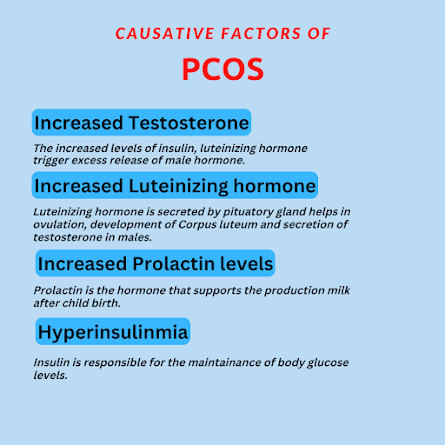PCOD and PCOS are some conditions that affect a woman's ovaries, reproductive organs which produce hormones like progesterone and estrogen.
These organs help regulate the menstrual cycle. The other little quantity of hormones that produce male hormones called inhibin and androgens.
More than 10% of women in the world are suffering from PCOD. Women suffering from PCOS produce more male hormones than the women suffering from PCOD.
This hormonal imbalance leads to skip periods and getting pregnancy also becomes difficult.
This unexpected hormonal behaviour, this condition can also cause:
- diabetes
- childlessness
- excessive hair growth
- pimples
Are PCOD and PCOS Serious Problems in Women?
PCOD and PCOS are very common disorders for a woman who is in her reproductive age (normally 18-50 Years)
What is a PCOD Problem?
PCOD full form is Polycystic Ovarian Disease.
PCOD is a medical condition in which a woman's ovaries produce large number of ovules or immature eggs. These become into ovarian cysts.
You May Like To Read: 5 Reasons Why You Have to Track Your Period
This triggers the ovaries to increase their size and produce large amounts of male hormones (androgens).
This results in infertility, irregular periods, hair loss and abnormal weight gain.
PCOD can be controlled easily through diet and lifestyle changes.
What is PCOS?
The full form of PCOS is Polycystic Ovary Syndrome.
PCOS is a metabolic disorder in which women are affected by hormonal imbalance.
This happens during a woman's reproductive years (between 12-51 years). The increased levels of male hormones can cause women to skip periods, irregularity in ovulation makes it difficult to conceive.
You May Like To Read: 5 Reasons Why Most People Fail In Love
The growth of abnormal hair on the body and face lead to serious medical conditions like heart disease and diabetes in the long run.
Many women do not know if they have PCOD/PCOS. The following symptoms affect ovulation and ovaries:
- Cysts in Ovaries
- Excess secretion of male hormones
- Irregular periods
What are the common signs and symptoms of PCOD problem / PCOS?
Generally some women notice symptoms during their first period, while some women find them when they get a lot of weight or pregnancy issues. The most common signs and symptoms of PCOD or PCOS are as follows:
- Skipping or missing periods (amenorrhea)
- Irregular menstruation (oligomenorrhea)
- Heavy bleeding (menorrhagia)
- Excessive hair growth (on face, body-back, belly and chest)
- Acne
- Weight gain
- Darkening of the skin (neck, armpits and under the breasts)
How PCOS is caused?
There are no exact reasons why or how women are affected by PCOS? But here are some important factors that trigger PCOS in women.
High levels of Insulin: Excess insulin levels in the body results in excess production of androgen (a male hormone that is very low in females). This hormone makes it difficult to ovulate.
Over Androgen production: When ovaries produce excess androgen hormones, they cause acne and hirsutism (hair growth on the body and face)
Low level inflammation: Recent study says, women with PCOS have low-grade inflammation which enhances the level of androgen production. This can damage your blood vessel or trigger heart problems.
Heridity: Women with PCOS have distinct genetic correlations in terms of heredity.
What are the complications of PCOS and PCOD?
Most women do not know what happens to her body when she has PCOD or PCOS. The increased androgen levels in their body affect their normal health.
Are You Suffering From Menstrual Cramps?
Menstrual Cramps Relief 30 Easy Ways to Stop Your Pain
The following are the complications of PCOS or PCOD that require immediate medical attention.
- Abnormal bleeding in the uterus
- Infertility
- Type 2 diabetes
- Premature child birth
- Metabolic syndrome (risk of high blood pressure, high blood sugar, diabetes and stroke)
- Non-alcoholic steatohepatitis
- Depression
- Endometrial cancer
- Sleep apnea
- Miscarriage
What are the future health problems of PCOD and PCOS?
Women suffering from PCOD or PCOS need to monitor their health regularly to avoid any future health problems.
If they ignore PCOD can lead to type 2 diabetes, obesity and other psychological issues due to hormonal imbalance.
Women suffering from PCOS will have serious problems like hypertension, hyperglycemia, endometrial cancer and pregnancy complications.
What is the difference between PCOD and PCOS?
Usually, women are confused whether PCOD and PCOS are the same or different from each other. Both medical conditions are associated with ovarian and hormonal imbalance in women.
The complications of PCOD and PCOS affect fertility of a woman.
Symptoms of PCOD and PCOS are normally the same. Find here some of the differences between PCOD and PCOS that every woman should know
Differences between PCOD and PCOS
In both disorders: PCOD Vs PCOS… healthy diet, weight loss, avoiding junk foods, processed foods and regular exercise have shown effective results.
Early diagnosis of the disease helps restore normalcy in any woman. Get yourself checked by a gynecologist if you skip or irregular periods, acne, back or facial hair growth.
Take Away :
Women’s reproductive health is never discussed openly and it is a taboo in many Asian countries including India.
The hormonal imbalance is the main difference between PCOD and PCOS and this can be reversed. However, polycystic ovary syndrome is an endocrine system disorder that cannot be reversed.
Timely treatment and care will make it possible to get pregnant even with PCOS and PCOD.
FAQ on PCOD and PCOS
What is the natural cure for PCOS?
Eating healthy food, regular workouts, and tracking the menstrual cycle will help cure PCOS.
Can I get pregnant with PCOS?
Yes, treatment on time for PCOS and PCOD makes you become pregnant.
How to cure PCOD problems permanently?
PCOD cannot be cured permanently. However, it can be managed with good diet and lifestyle changes.
Can PCOS increase the chances of twins?
Women with diabetes during PCOS will have the chances of twins, when she uses metformin or in combination with clomiphene/clomid.
What is the best age to get pregnant with PCOS?
The ability to get pregnant starts to decline after the age of 30, so it’s better to get pregnant before that period.
PCOD or PCOS which is more dangerous?
PCOS is more severe than PCOD. However, both can be managed with treatment and diet changes to balance male hormone (androgen) levels.
Is there a permanent cure for PCOS in Ayurveda?
There is no proven research on the prevention of these disorders in Ayurvedic medicine. But the use of ashwagandha, cinnamon and turmeric can give better results to prevent the severity.
8. Is there a permanent cure for PCOS in Ayurveda?
The best home remedies for PCOS include: daily exercise, 7-8 hours sleep, intake of Magnesium rich foods like almonds, cashews, bananas and intake of iron rich foods like spinach, broccoli, eggs, complex carbohydrates and protein diet.
The most important remedy is you must avoid processed and junk foods.
















0 Comments